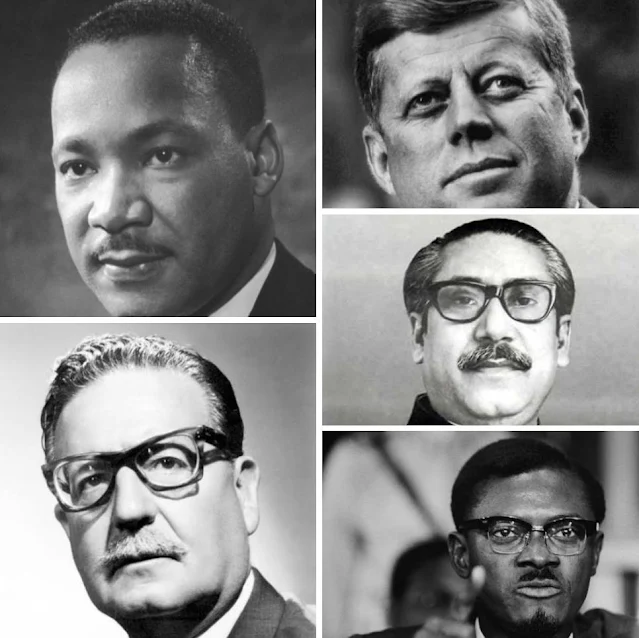 |
| Clockwise: Martin Luther King, John F Kennedy, Mujibur Rahman, Patrice Lumumba, Salvador Allende |
By Bharat Dogra
Which world leader faced the most attempts on his life or other attempts to injure and harm him?The answer to this question is very clear—Fidel Castro, President of Cuba. There were so many attempts made to kill or harm him that he and his security personnel must have lost count (in addition there were attempts also to kill or harm Raul Castro).
Most of these efforts were made by the CIA, or those adversaries of the Castro led government having close links to this agency.
However much to the credit of his security personnel, Fidel Castro managed to survive all these attempts.
Unfortunately some of the other most promising emerging leaders of the majority world did not have equal protection or equal luck. Some of those who died in CIA directed operations had the promise of emerging as the most popular leaders of their country and even continent in due course of time. They had another thing in common. They were committed to socialist ideals, and wanted to take their country along the socialist path. Patrice Lumumba, Prime Minister of Congo, was one such leader. Not just his country but the entire continent of Africa had high hopes from him but in 1961 he fell victim to a CIA plot , together with many others of his people and soldiers after a secessionist movement instigated by the CIA and Belgium engulfed the newly independent country in terrible violence.
Salvador Allende, President of Chile, was another extremely tragic victim of a CIA plot. He was killed at a time when he was being identified increasingly as the initiator of a people-based socialist path which could have inspired the entire Latin American region.
Che Guevara may not have been the top leader of any country, but for the socialist revolutionaries of many countries he was even more inspiring than top leaders, and his inspirational role could have only grown. However he too died in a CIA-led plot.
When the US Senate Committee known as the Church Committee discussed several such assassination allegations in its Assassination Report in 1975, it did not really deny these plots ( about a dozen were being talked about then) but preferred to treat these as ‘aberrations’ which do not represent the ‘real American character’!
Later in his book ‘Rogue State’ William Blum gave a list of over 30 foreign leaders in whose successful or unsuccessful assassination plots the CIA had been involved in during the period 1949-1999.
This list is not all-inclusive, and there are likely to have been several other cases too. Several reports have appeared regarding the links that those who killed the most popular leader of Bangladesh Sheikh Mujibur Rehman and his family members had with a western embassy personnel.
.jpeg) |
| Che Guevera with Fidel Castro |
However as far as internal political assassinations are concerned, the record of some communist governments including the Soviet Union and China has been even worse. In the case of political assassinations involving the leaders of other countries, the USA is clearly the world leader. However it may not have acted alone and the agencies of some of its close allies may also have been involved in some of the most tragic assassination plots, including those involving Prime Minister Lumumba and President Allende.
To understand the fuller impacts of these assassinations, we must remember that these were often carried out (as for example in the Congo and Chile) as parts of much bigger interventions which led to the death of tens of thousands of people, often in very cruel ways.
What is more, the life of some of the most promising leaders was cut short in a very cruel way. These leaders like President John Kennedy, Martin Luther King, President Allende and Prime Minister Lumumba had shown so much potential for taking the world further on the path of peace and justice. What is more, leaders like President Allende and Prime Minister Lumumba were replaced , with the approval of those who planned their assassinations, with those leaders who set new records of cruelty and torture.
It is a question worth exploring in detail—why is it that the leaders most committed to peace and justice became the most frequent victims of political assassination?
---
The writer is Honorary Convener, Campaign to Save Earth Now. His recent books include “Planet in Peril”, “Protecting Earth for Children”, “Earth without Borders” and “A Day in 2071”

Comments